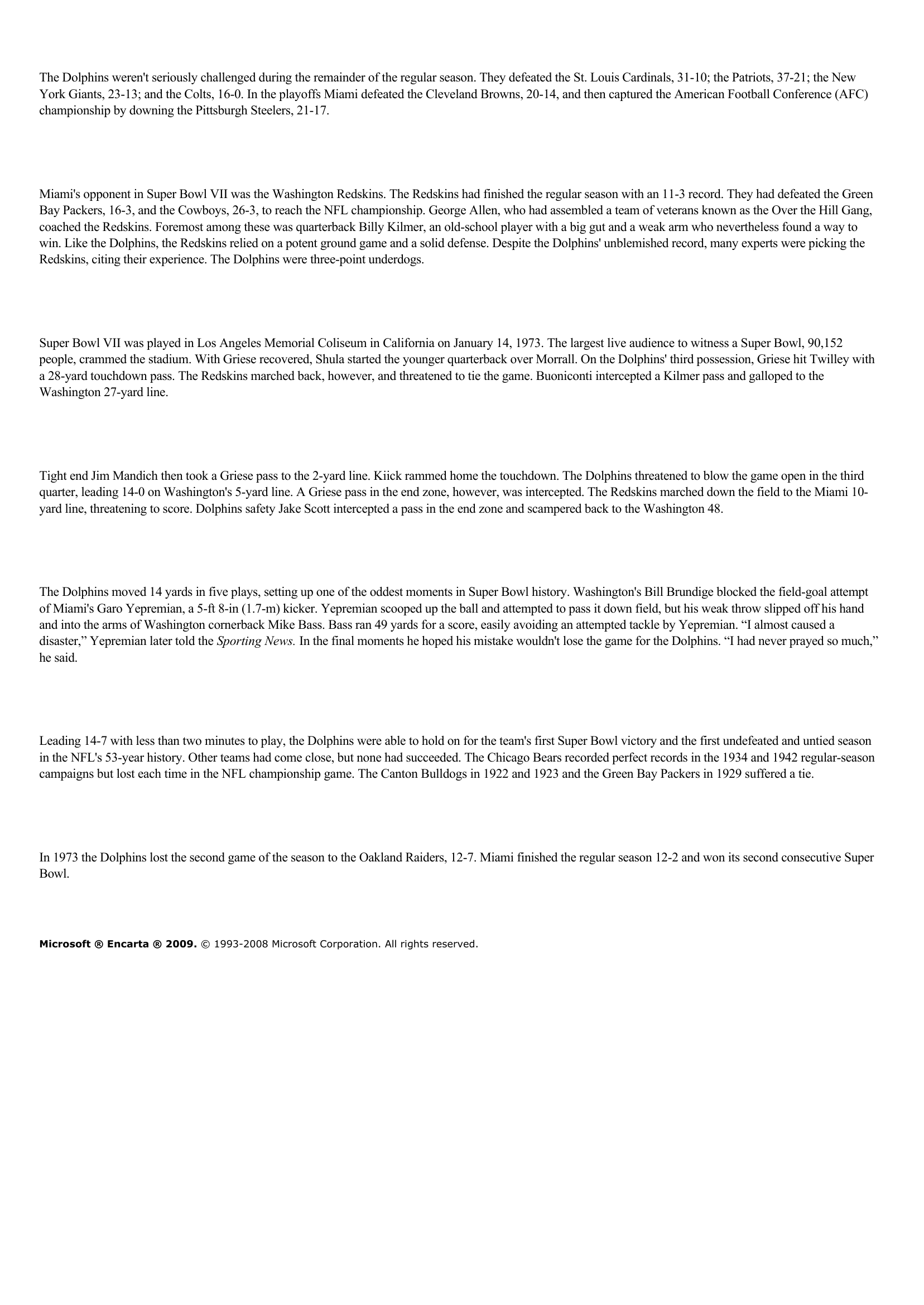The Undefeated Dolphins.
Publié le 14/05/2013
Extrait du document
«
The Dolphins weren't seriously challenged during the remainder of the regular season.
They defeated the St.
Louis Cardinals, 31-10; the Patriots, 37-21; the NewYork Giants, 23-13; and the Colts, 16-0.
In the playoffs Miami defeated the Cleveland Browns, 20-14, and then captured the American Football Conference (AFC)championship by downing the Pittsburgh Steelers, 21-17.
Miami's opponent in Super Bowl VII was the Washington Redskins.
The Redskins had finished the regular season with an 11-3 record.
They had defeated the GreenBay Packers, 16-3, and the Cowboys, 26-3, to reach the NFL championship.
George Allen, who had assembled a team of veterans known as the Over the Hill Gang,coached the Redskins.
Foremost among these was quarterback Billy Kilmer, an old-school player with a big gut and a weak arm who nevertheless found a way towin.
Like the Dolphins, the Redskins relied on a potent ground game and a solid defense.
Despite the Dolphins' unblemished record, many experts were picking theRedskins, citing their experience.
The Dolphins were three-point underdogs.
Super Bowl VII was played in Los Angeles Memorial Coliseum in California on January 14, 1973.
The largest live audience to witness a Super Bowl, 90,152people, crammed the stadium.
With Griese recovered, Shula started the younger quarterback over Morrall.
On the Dolphins' third possession, Griese hit Twilley witha 28-yard touchdown pass.
The Redskins marched back, however, and threatened to tie the game.
Buoniconti intercepted a Kilmer pass and galloped to theWashington 27-yard line.
Tight end Jim Mandich then took a Griese pass to the 2-yard line.
Kiick rammed home the touchdown.
The Dolphins threatened to blow the game open in the thirdquarter, leading 14-0 on Washington's 5-yard line.
A Griese pass in the end zone, however, was intercepted.
The Redskins marched down the field to the Miami 10-yard line, threatening to score.
Dolphins safety Jake Scott intercepted a pass in the end zone and scampered back to the Washington 48.
The Dolphins moved 14 yards in five plays, setting up one of the oddest moments in Super Bowl history.
Washington's Bill Brundige blocked the field-goal attemptof Miami's Garo Yepremian, a 5-ft 8-in (1.7-m) kicker.
Yepremian scooped up the ball and attempted to pass it down field, but his weak throw slipped off his handand into the arms of Washington cornerback Mike Bass.
Bass ran 49 yards for a score, easily avoiding an attempted tackle by Yepremian.
“I almost caused adisaster,” Yepremian later told the Sporting News. In the final moments he hoped his mistake wouldn't lose the game for the Dolphins.
“I had never prayed so much,” he said.
Leading 14-7 with less than two minutes to play, the Dolphins were able to hold on for the team's first Super Bowl victory and the first undefeated and untied seasonin the NFL's 53-year history.
Other teams had come close, but none had succeeded.
The Chicago Bears recorded perfect records in the 1934 and 1942 regular-seasoncampaigns but lost each time in the NFL championship game.
The Canton Bulldogs in 1922 and 1923 and the Green Bay Packers in 1929 suffered a tie.
In 1973 the Dolphins lost the second game of the season to the Oakland Raiders, 12-7.
Miami finished the regular season 12-2 and won its second consecutive SuperBowl.
Microsoft ® Encarta ® 2009. © 1993-2008 Microsoft Corporation.
All rights reserved..
»
↓↓↓ APERÇU DU DOCUMENT ↓↓↓
Liens utiles
- exposé anglais introduction to the Consumer Society
- Le théâtre a-t-il pour fonction de tout dire, de tout expliquer au spectateur de la crise que vivent les personnages? - Par quels moyens et quelles fonctions Juste la Fin du monde est une pièce qui nous retrace la crise de cette famille?
- Ideology and Rationality in the History of the Life Sciences
- is the cultural difference a barrier between individuals.
- Subject: What are the impacts of racism on black people in the United States

































